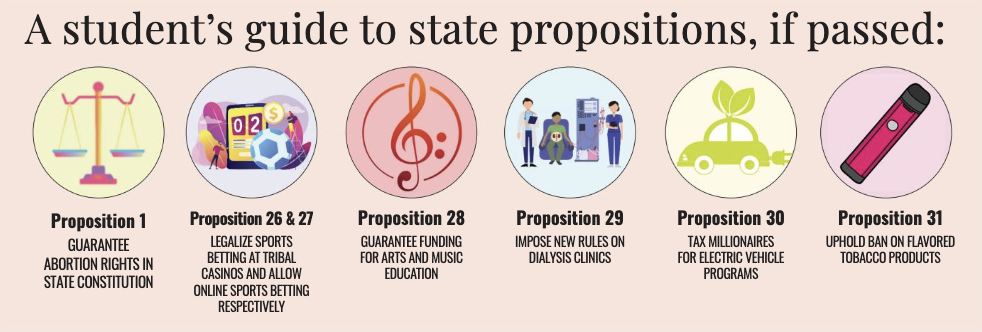
Infographic by Bryanna Bartlett
Melinda Jackson, a San Jose State political science professor and associate dean for undergraduate education, broke down the propositions for the university community on the ballot for today’s general election.
There are seven propositions on the ballot.
Prop 1
Proposition 1 aims to establish a central basis for reproductive freedom that would particularly deal with the right to abortion and whether an individual wants to refuse contraceptives.
Jackson said those rights are somewhat already protected.
“We already have those rights protected in California, but this would put it into the state constitution, which is a greater level of protection,” Jackson said. “To change something in the state constitution is a lot more difficult than to just change a state law.”
Jackson said that is the reason why the proposition is on the ballot in the first place, as after Roe v. Wade was overturned on June 24, states had put in place more restrictions on abortion rights.
Jackson said that the “forward-thinking” proposition is very important for students.
Prop 26 & 27
Jackson said Propositions 26 and 27 are very similar and are often the most confusing with TV ads.
“Both of them would allow sports betting in California, which is currently not allowed,” she said. “They would do it in different ways.”
Proposition 26 would allow in-person commercial sports betting at racetracks and existing regulated Native American casinos in California, according to a Oct. 6 Los Angeles Times article.
Proposition 27 would allow online and mobile sports betting and is backed by sports betting companies including DraftKings and FanDuel, according to the Los Angeles Times article.
The proposition would require online sports betting companies to partner with tribes to participate in online gambling.
It would allow tribes to create their own betting platforms, but would have to pay an exorbitant licensing fee to betting companies.
It also requires tribes and the companies to pay 10% of the sports bets made every month to California.
Prop 28
Proposition 28 would require California to spend a certain number of the state’s funding on its own public education, according to the CalMatters Propositions Voting Guide webpage,
“This is the one that has almost no opposition,” Jackson said.
She said it would ensure that 0.1% of funds raised in public education would be designated for music and the arts in public schools, including grades K-12.
“The reason that supporters put this on the ballot is because when we have budget downturns in California and the amount of money going to schools declines, its arts and music programming that usually tend to get cut first,” Jackson said. “Sometimes even when there’s more money a few years later, they don’t come back.”
Prop 29
Proposition 29 would make it mandatory for kidney dialysis clinics to supply one physician, nurse practitioner or physician assistant with an experience of six months available to patients on the site or even, in certain cases, online via Telehealth, according to the CalMatters Propositions webpage.
“Yes. This is the third time that this proposition has been on the ballot,” Jackson said.
She said those who advocate for that proposition argue that the process would be made safer, while those who argue against the prop argue that this would cost more money, which would cause more dialysis clinics to shut down.
She said those supporting the proposition are worker unions, who have been trying to bring those technician workers together, while the other side is being occupied by businesses that control the clinics.
“It’s really kind of a business argument. Like, a business vs. labor argument,” Jackson said. “A lot of people argue that this is actually kind of a political strategy, that they’re using this tactic of putting this proposition on the ballot that creates this financial threat for the companies and it also forces the companies to spend a lot of money to try to defeat the proposition.”
Prop 30
Proposition 30 would put a 1.75% tax in place on incomes above $2 million for zero emission cars and for wildfire prevention initiatives if passed, according to Ballotpedia, a voter’s guide website.
Jackson said a law that recently passed states as of 2035, California residents won’t be able to purchase new gasoline vehicles and from that point on, all new vehicles won’t be gas powered. wIn other words, Californians will fully transition to low emission vehicles.
“This proposition would try to address those issues, those larger issues of climate change and the air quality by providing funding for people to buy an electric vehicle,” Jackson said. “Not pay for the whole thing, but it’s like a voucher, like a discount coupon.”
Jackson said that is another proposition that’s very important for students to pay attention to, as climate change is very important for younger people both at a global and local level.
Prop 31
Proposition 31, according to the CalMatters webpage, would decide to uphold a law passed in 2020, which is to prohibit the sale of flavored tobacco products.
A ‘yes’ vote would continue to maintain the law and a ‘no’ vote would put down the law and make the sale of these products legal.
“This is one that, again, a lot of young people do use these products,” Jackson said. “The thing with the flavors, I mean, these are not regular tobacco flavors. They are obviously aimed at younger people to kind of get them started with vaping and get addicted to nicotine.”
The deadline for in-person voting is 8 p.m. today. Mail-in ballots must also be postmarked by today.